In a couple of previous posts I’ve shared clips from this interview, in which Lona made the compelling argument that learning music theory enables us to “listen in HD” and explained what (to her surprise!) she loves about the ABRSM Grade 6 Theory exam.
I hope you enjoy the interview! Have you taken ABRSM’s Grade 6 Theory Course? Leave a comment below!
Links
Lona prepares students of all ages to take ABRSM theory exams via her portal schoolofmusictheory.com. I recommend checking it out!
Lona’s Grade 6 course can be found here: ‘Mastering Grade 6 Music Theory: Composition, Harmony, and Analysis’.
Lona also offers a fascinating course on realising Figured Bass, perfect for harmony and improvisation enthusiasts!
Lona Kozik: A Short Biography
Lona has had a fascinating career as a composer as a pianist and composer. Having studied at multiple institutions including West Chester University, University of Pennsylvania, and Mills College before settling in Devon, UK in 2003. After establishing herself in the UK academic scene teaching at various universities, she founded both the Totnes School of Piano (2012) and School of Music Theory (2019). Her creative work spans acoustic and electronic music, with notable releases including her piano etudes "Fast Jump" (2009) and the improvisational album "Spelaeology" (2015), and her compositions have been performed across Europe, North America, and the UK.
Transcript
Garreth
Hello and welcome to Piano Creativity. I'm delighted to be interviewing Lona Kozik, who runs the School of Music Theory, which is available at schoolofmusictheory.com. Lona's a fascinating teacher who's been working as a pianist and teacher for a long time. I came across her through the Curious Piano Teachers, and some of my colleagues had taken courses with her and raved about how clearly and enthusiastically she explains things.
I was checking out her website, and several things drew my eye. One of them was a sentence she wrote in her "About Me", which says, "I believe that music theory is the key that unlocks all musical treasures. It can be engaging in its own right, but music theory is a means towards greater musical expression and creativity."
And I really wholeheartedly agree with that. There was another post about grade six theory, which we're going to talk about in a bit as well.
Lona
Thanks for asking me to come along. I love to talk shop.
Garreth
I was fascinated to read about how much you like the ABRSM grade six theory exam. Can you explain?
Yes, I can explain, and it surprises me as well, because I'm not someone who usually is into the grades, either for piano, which I also teach, or for theory. If a student wants to do it, great, if they're ready, we'll do it, but I'm not one to chase it. When I very first started teaching theory online, I did my very first course and then people said to me, please, will you do a grade six course?
I thought, oh, how interesting. I got it from more than one person. So I thought, okay, this must be some kind of thing. So I get a grade six pass paper and I open it and I was like, Oh, that's why. Because having been a piano teacher for a while in the UK, I was used to getting students ready for grade five and understood, all of that, but hadn't really delved much past.
I think one person had come to me for a bit of grade six when I very first got here. Exams weren't really on my radar at that point. But when I opened the book, I saw why people were asking this because the jump from grade five to grade six is enormous. So I started teaching people grade six and yes, you've seen that blog post, why I really love the grade six exam.
In a nutshell, I really value students learning by doing. With music theory, there's a trap that everyone falls into, which is it can feel very aside from music making You can even get such wonderful textbooks.
As a piano student, I was required to take theory. I did not have an interest in theory theory only became engaging when we were linking it to music making, either we were listening and analyzing a score or doing a composition exercise.
I might have learned about Neapolitan chords, and so the assignment for End of Term is write a sort of 16 bar piece that includes a Neapolitan, and you have to resolve it correctly I personally found that with those pieces, They weren't really my pieces.
I was not a composer at that point, but they started to grow. They started to get bigger and bigger. I love the way the first three questions are composition based. And they're asking you to demonstrate your deep understanding of the language through using it.
The first question is harmonizing a melody, and you have to choose chords. That seems pretty simple, pretty straightforward. But you also have to choose inversions.
That's essentially writing a bass line. And it has to be a good one.
It can't just be random. Depending on the style of the melody. Certain inversions you want to stay away from unless they're being used specifically for something. It's wonderful that we're actually making a bit of music, but we're diving very deep into the language.
And that's all music theory ever is. It's observing a musical language and codifying it, so that if you want to write in that style, or if you're playing that music, You can unpack all the details of that music music comes to us through the air and it's kind of magical.
It's intuitive. We can't hold it down. We can't point to it in a gallery we can't open the book and read it. It comes to us through the air. It's already quite an intuitive practice by nature and theory gives you those really specific tools where you can actually be very specific and point to this is the feature of the style that exam asks you to demonstrate it's a weird exam because that first question you could get any sort of melody more folk based or a children's melody yes, you want to use diatonic harmony, but it doesn't have to be, the style of a classical composer.
Then you go on to the second question, which is four part writing. and soul of classical music, classical with a lowercase c, of course, because this is what all composers of the style trained with, and still do in certain places.
You're given a baseline with some figures under it. Now you're not choosing the harmonies. They're chosen for you. The baseline is written and you have to realize the soprano. You have to write a good soprano line. Fill in the inner parts alto and tenor, and use good voice leading.
So you're diving, you're digging down. Even deeper, which is so much fun. And the way that I teach it, I tend to avoid handing over a list of avoid this, do that. We get there in the end. I give enough that we can get started. And then every week we look at what people have written and we talk about it.
People will remember things that way and they'll remember the reasons why something is Not what you want to do. Maybe more like this kind of thing I think of it as like painters. I don't know anything about painting but I know like I sometimes watch and when they make mistakes on a canvas they'll just paint over it.
Yeah, well and it's it's like these layers And that makes the painting. Without those layers, you don't get that painting. It's almost like building up this picture of what is the heart of classical music. How does this harmony really move? How does it make drama?
How does it make us feel anything? And we go on to the third question, which I think is the hardest, and people call that the composition question. You're given an opening melody and you have to finish it. You have to do, between 8 and 12 bars for a particular instrument, so you've got to know that instrument, you've got to know a little bit about orchestration.
And then the last two questions are score analysis, which are really straightforward. That's more of the textbook style theory, but I just think taking people through that progression really allows for a deep engagement that Other types of examination kind of don't, you can really get into the nitty gritty of things and you can really understand what music theory is about in a meaningful way.
Garreth
And then when they encounter a piece that's written in the style, or even influenced by it, then they have such clear understanding of the creative decisions the composer's made, and why they feel the way they do. Even an appoggiatura that's a feeling, isn't it?
Lona
Yes. That tension and resolution many student pianists see that and don't understand why it makes them feel the way they do or why it has to be played in the way it does.
This can affect your playing. You can make good decisions. You can understand the architecture of the piece you're playing, your role as a musician, these are old pieces, if you're doing Bach, Mozart, whatever you're doing, two, three hundred years old, that needs some interpreting, if you know the style well enough, you can, put things over almost like an actor, you can make decisions and of course it's important to have good intuition.
And of course, a lot of this comes naturally to a musician, but, being able to articulate those things in specific ways. sharpens the tool, that's why I think it's the kind of study that will get you past a good intermediate into more advanced playing.
I also had a student, he's now doing the beta round of Trinity diploma. he went through grade six, seven, eight with me. at the end of grade eight. He told me, this is such a great comment. He said, “I go to a concert now I really love Baroque music and I can hear everything now.”
And I thought, imagine you love that music anyway, which I did as a teenager, I was trying to find pieces with Continuo 'cause I thought it sounded cool, on the radio. not knowing what it was. so you're drawn to it anyway, but then all of a sudden you get HD.
It's like listening HD. You can really hear everything and it just makes everything sharper and clear. So even just listening is enhanced.
Garreth
I've experienced that several times with my wife, who's, an artist. She has a really intense connection to music and she loves it. Sometimes we're listening things together and I'm like, oh the bass line there's really cool and I realized that she can't pick out the bass line or hear those little details. That's a great illustration of how understanding really enriches our enjoyment of something. It should be about loving music. Ultimately, that's the point, isn't it? it enables us to love it more.
Lona
Absolutely. And I think if theory is taught well, it's generating all those discussions and the questions come up then you can dig in really deep to that thing that you love already. It just makes you love it more,
Garreth
from my understanding of the exam, it's very focused on, writing in good grammar, Is that a fair comment?
Lona
you have to understand, the contrapuntal principles, of music, but that carries on into the classical and romantic styles for sure. And you have to understand, diatonic harmony and the way that it's weighted, the gravity and how it works.
Within a scale, why do we feel moved this way or that? Why does the modulation make us feel that way, and it's interesting because that's cultural. That's not universal, but it's very embedded in Western culture.
Garreth
I remember doing a lot of that stuff at university and finding it very dry, very dry. The tutor had been teaching for such a long time, he sort of lost interest in engaging with another round of students who didn't really understand it. I found it really uninteresting and uninspiring. I had an analysis teacher who was so enthusiastic about analysis that I fell in love with analysis. the analysis I did at university really helped me to understand how I wanted to work as a composer. Those two examples are illustrative of the two kind of schools of teaching music theory.
There's the very dry one and there's the engagement one that teaches people how to fall in love with music. My question for you is how do we as teachers explain it in an engaging way? How do you do it in the course?
Lona
So you can buy workbooks and our practice stage we've done loads of stuff before that So I'm interested first of all engaging with source so Bach chorales or whatever it is that we're looking at as much as I can but I know that people also want to be told things. They don't want to jump in blind. Not a lot of people want to do that.
I went to the University of Pennsylvania for composition for my PhD, and I had a TA-ship, which meant I assisted a professor with his class.
Garreth
Oh, cool.
Lona
I was lucky enough to assist Christopher Hastie, who's now at Harvard and wrote an amazing book on rhythm and how important rhythm is in music, which I think is something we sometimes ignore because we're looking for harmony.
He had a class that sonata allegro form, so first movement sonata form, and he did not want me to stand up and talk about exposition, development, recapitulation. I was not to talk about any of that.
We were looking at Haydn string quartets. marking off phrases and discussing what was happening. he would have the lectures and then I had the twice a week work sessions. It's a principle of teaching that if you know something and then ask a question and you know the answer at that level, the student knows that "why don't you just tell me?!".
They don't want the Socratic method. But I followed his, I mean, I was working for him, not the other way around. The students knew, they're like, we know that you know. I said, I do know, and I was taught differently to this, and then I said, trust me, this is much better. Because if you stand up and you say, this is how Sonata Allegro form goes, then we're always looking for it.
That's not always how it goes. you might be surprised to know that there are plenty of three and five bar phrases in Haydn. If you can engage directly with the source and dive quite deep and then extract from that all sorts of things, this is useful in terms of really understanding the form, but it's also useful for composers and performers.
This is useful for everyone. So I try to make it contextualized in that way and engaged in that way with actual music.
Garreth
Yeah, so the music of the great composers is the first thing that you look at And then you expand from that into the rules?
Lona
Not always, no, as much as I can, I appreciated Chris's, putting them right in the deep end, it was fun, they were a great group so they went along with it, I usually kick off grade six with a workshop that everyone's invited to, and I teach principle first. I teach an overarching harmonic principle that can apply to everything grade six and beyond. We return to this idea throughout grade six, seven, eight, and even diploma.
I think there are, you can also engage with source material or make it contextualized within music making, whether that's listening or playing, but I think also it's good to just teach concepts I know a lot of people rely on workbooks and I find that the workbooks are exercises and feel cut off from things. They really need to come after you've already had plenty of time working through concepts if you're leading a piano student let's say you want to get them through to grade five they should already have fluency of chords starting with primary chords in different keys and it really is getting to like what can we do to make let's say thinking in a key which is what harmony is a lived experience, something that's in your hands, keyboard harmony, even if you're doing something as simple as teaching structures of scales, you should have already done plenty of scale playing at the piano, I noticed that students can learn, this from teaching people grade 5 separate from piano.
They'll know like a harmonic minor scale, but they don't understand the theory structure of it. If it's already in their fingers, then that's a big help. Yeah. So I think it's just trying to contextualize that teaching in various ways.
Garreth
And because you run, online courses for people who want to take this exam I'm curious about how the practicalities of studying with you on one of those courses works.
How long does it last and how do you teach it, a conversation or is there, exercises, how does it work?
Lona
For the current grade six course, each question is a module, and there are eight week modules, and the first four weeks are, there are lessons, you know, so I might teach concepts, and then there are exercises, then we have four weeks of practice, and the exercises are based on the exam question.
And then we have, I give weekly feedback, so students submit their work, and then I give live feedback. Well, it's either live or, on video, but it's personal and detailed. . In my mind, we're sketching things out. the biggest challenge for me as a teacher is to make everyone feel okay with that because it means doing things that you're just taking a stab and it might be wrong.
Actually, I've said to people, it's kind of cool when it's wrong because then we get to really talk about the concept. If I just delivered, the lesson and then everybody got it right. we wouldn't be able to dive in, so it's getting people on board with that learning process. Harmonizing melodies, four part writing, melody writing, eight weeks. I look at it as four plus four. it's a combination of online self study, lesson videos, worksheets, PDF notes, and the main thing is doing the work, doing the exercise, and then talking about it either in a live Q & A where we meet. So it used to be Fridays, Friday mornings. It still is, Fridays. And then sometimes by video. if someone wants to sign up, separately from an incoming group. They can do that, and then they submit work to me when they're ready, and then I feedback video. and then the score reading, well, it's pretty much the same thing, but with the score reading, we go to the workbook because, they've got all the examples, and it's set up the way the exam's set up. that's how we do it.
Garreth
Is there a minimum or maximum group size? What can people expect from their peers in the class?
Lona
If they're in a live group, I keep it to about four or five, so that we can take an hour to 90 minutes and look at everyone's work for the week. that's very useful because, you can see what other people have done and things come up that you never thought of, it's a very enriching experience in that way. People have also done it by themselves, and that's fine too.
if people can't attend the courses at a specific time, there's a flexible way people can still join in.
So I initially only ever ran it live, but now it's going to have two options, the thing about running it live is I would launch it maybe once, maybe twice a year.
It just depends on the workload of the year, and people were waiting a long time for it to come around again. And I thought that's not the best thing. If someone's motivated, they should really go in. So then I made it available. I thought, No, actually, we could also do this in a slightly different model.
They're still getting feedback. It's really good.
Garreth
and is it mostly piano teachers that are taking it?
Lona
When I first started, advertising, I was in the music theory groups. So it wasn't just, but I was also in the piano group.
I let everyone know this is happening. I ended up with lots of piano teachers, I've had a few. one studio musician, one guitarist. I've had an amateur piano player, but he's very good. He's taking his Trinity diploma this year. he's a pharmacist, another person who's more like a hobbyist and, a lot of piano teachers.
Garreth
One of the things that my colleagues who've taken your course were really complimentary about was how, clearly you explained things and they didn't feel stupid when you were explaining these complicated concepts to them. The other thing that they felt was, some of them were a little bit nervous, like they felt that they're not confident or not good at theory. You've been able to give them a confidence boost and that was another big feature of the feedback Which I thought was really lovely that's a great bit of feedback to give you personally I guess I'm wondering how do you do that?
Lona
I love to get to concepts and I find that interesting. the way I see it is the people who have come along, find it interesting too. It might be something about a philosophy of teaching that you're just further along the timeline, but you've gathered the people who are like you, who want to talk about this, right?
And I think you talked about your teacher at uni poor guy. that can have an effect you can read that in a teacher This is why teachers have to do a lot of self care and time so that the energy is there I love hearing that because I Remember that and I remember getting quite You know, I grew up, I grew up in an Air Force family, so, just pull your bootstraps up and do it anyway.
And I remember feeling that I had to do that at first, because it is scary, one thing I noticed was, I had a couple of really fabulous teachers who made me feel that way. maybe I'm modeling after them,
It was just fun to be there with them. they knew more. But I was invited to give my observations and I learned a lot from doing that. So I think, yeah, That's a high compliment
Garreth
I've had teachers who've done that for me, and their impact is enormous. Really transformative. And I think that's something as teachers. If we've been lucky enough to have that, we really need to pass that on.
Lona
Yes, what you said about transformative is the key, and that's what I would want for anyone.
I do think that's what you can get from studying theory, and whatever else you do next, you're gonna have that there. That's a huge asset. I have also been in classrooms where I've felt like the person at the front maybe they were tired and fed up and you felt stupid I just pulled up my bootstraps and said I'm gonna do this Anyway, get determined any teacher would love to hear that, but I really specifically want to welcome everyone who may not, for whatever reason, feel welcome all the time in those circles.
Thank you for telling me that. That's wonderful.
Garreth
I guess another line of questioning I have is about whether, does every student go on to take the exam if they've taken a course?
Lonna
One lady was just doing it for fun. it was during lockdown that she signed up. She's like, what else am I going to do? I enjoyed having her in the class. She got really, advanced, too. She did wonderfully. She would have done very high pass. she did take six, but didn't take one of them. another lady already had all of her qualifications.
She already had a very high level understanding of theory. I was interested that she had taken the class in the first place. somebody else, very similar, already had a lot under his belt and composed music already, They just took it for enrichment or further development or just wanted to be in on the conversation, I guess.
Garreth
Do you think it's a good course for someone interested in composition to take?
Lona
Yes. I think with composition, it is very good because you just have to choose a discipline to study. It doesn't even matter what it is. you're just learning to deal with the elements of music and to make some kind of structure that will stand up.
When I was at Penn, they were very traditional and it was heavy on style study. and we hated it and complained all the Never saw the benefit until much later. So there you go, there's another lesson for teachers.
but we had to do very specific, like, you know, a sonata in the style of Mozart, a song in the style of Schubert. We want this piece in the style of Rachmaninoff. And so you had to really hone in on that composer. Complained the whole first year. by the second or third year, it was just how we were doing things.
And it makes you quick in all sorts of ways. it makes you quick in decoding language. It makes you quick in being able to wield the language. music is a language, everyone. And when you study theory and when you study style and when you get into the very deep understanding of style and how that's made, you can wield that language in any direction you want to go in,
So, it doesn't even matter. You just got to choose a discipline. if you're more drawn to jazz, Study Jazz Harmony, there's loads to study there. if you like classical music, study classical music. I had a semester, about 15 weeks, looking at Indian classical music, looking at the counterpoint of that, and that was very fruitful study.
I don't go around composing that, because that's not my language, but it really sharpened my language. a composer needs to get stuck in with as much as they're attracted to.
Garreth
And I guess one of the things that I struggled with when I was taking that kind of course was just that it was, like you said, a style study or how to… the rebellious part of me was like, but I don't want to follow the rules and I don't want to be Beethoven or whatever. With a bit more maturity, I can say that it's really valuable to learn these styles. but I also think if you go too far in the style direction can be quite deadly to any sort of sense of spontaneity. And so I guess one of my questions is, how do we leave space for students to be themselves while also trying to explain to them why it's important to learn the rules of whatever we're teaching them?
Lona
spontaneity, do you mean...?
Garreth
Or maybe personal… I think every composer has their own personality that sort of becomes uncovered, like a sculpture comes out of a big block of stone. Part of the work that I really enjoy with my Composition or Improvisation students is figuring out who they are what their interests are and how that's been shaped by their background. The student that jumps to mind is a Japanese student of mine who I've been doing loads of Riemenschneider, Bach Chorales with and she loves it.
We’ve been doing that alongside stuff that explores what she's curious about and I've opened up that world of Bach to her, which isn't something she was interested in before, but I'm trying to allow her to be who she is. I know that's not what you're trying to cover in the course, but as a general principle, when we're teaching students to follow rules, how do we show them that they can also break those rules and be themselves?
Lona
I think it's just two separate tracks, two separate things that are, so it's like teaching the composer, but bringing out the composer. it's a little bit like if you want to run at the Olympics, you have to do a certain set of. exercises and strengthening and that sort of thing. the exercises and the strengthening is whatever discipline you're looking at.
So it could be the Bach Chorales or it could be something else. one way that I've done in the past with, students at university is to ask them to map out a constellation of their influences. there is a composer, John Harbison an American composer, and he said that we as composers are all at the top of our, musical family tree and you get to choose who's in your family.
Now, I liked that idea, but I'm not at the top of my tree because Ligeti is in my tree and he's seriously at the top. So maybe it's more like a constellation. their influences, what they're interested in, and it's going to influence their voice, but it's becoming aware of that.
I think all of this is about bringing things into awareness. you don't want to lose touch with the intuitive side of music, but for me, That's always there. I don't think that having a disciplined track where you're really rigorously studying a style is going to endanger.
I don't feel like it endangers the intuitive side. As a teacher, as long as both sides are given equal attention, then it's fine. I have come across people who feel almost superstitious about that. Like working in the theater, I worked with someone who wrote musicals, but he didn't know how to write things down.
they employed me, at 3, 000 for the summer, to write it down. I said to him, you should learn to do this because it's not hard the music director was saying, no, it'll ruin your gift. in my head, I was going, it really won't. I promise.
Garreth
it'll probably enhance your gift.
Lona
I think so, because then you just write it down and nobody has to pay me. I mean, I loved being paid and hanging out with the theatre people, but, you come across that fear that it's going to somehow negatively impact, The creative life. the creative life is something slightly different and it needs its own kind of nurturing, and I really believe that composers need both, because you also need the rigor of being able to wield your tools so that you can articulate your voice.
And even develop it, because I think intuitive musicians, not all, we could bring out examples. There's the Beatles, there's Pavarotti, my belief is that, Most of the time, if you're purely intuitive and you never learn past that, you might be missing out on developing your own voice, being able to write in that style or this style means that you can understand how to Develop your own style it takes time I would look at that as two different tracks and give plenty of I don't know I I'm sure you give sort of not assignments so much but nurturing that creative side and it's it's a totally different thing from the chorales.
So it's nice to hear that you're doing both with the students and that she's enjoyed the chorales.
Garreth
It was really fun because I wanted her to have that understanding and I wasn't sure whether she would enjoy it. She actually requested it. Even if I'm like, no, we need to stop thinking about something else. She's like, can I do another chorale? I'm like, oh, that's great.
Lona
It's really interesting. I did go to California to study improvisation for a few years. that was very different because we weren't trying to improvise in the style of anyone. In fact, it was free improvisation.
we were very much trying to get away from. A lot of things the guiding discipline was learning to listen and learning to be in a moment and learning to let your music be part of that moment. that's different from composition, but there's a relationship to it. if there's any discipline for a composer, it's learning to sit with yourself.
It's learning to be alone. It's learning to listen, to tap into those. Deeper sources, your intuition. You can develop your intuition. There are ways. that's very different from Bach chorales.
Garreth
Yeah, and it's not the focus of your course either is it? But I love getting that broader perspective as well.
Yeah. I think my camera froze for a little bit of that. Hopefully I wasn't pulling too ridiculous a face as it did.
Lona
You never know.
Garreth
This has been really fascinating. I'm sure everyone who's watching will also be really fascinated as well.
thank you for taking the time to talk to us about it. I will put links in the post below to how they can find out more about your work and your interesting biography and, to sign up for the course.
Lona
Thank you.


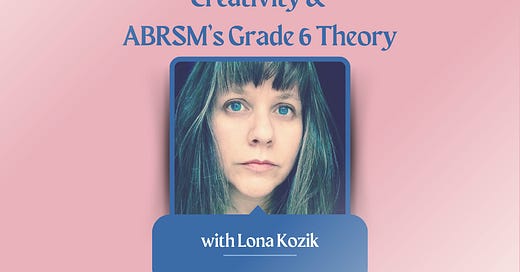



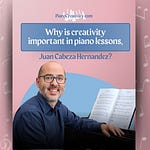

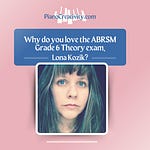

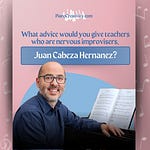
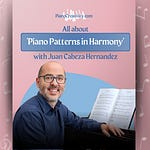
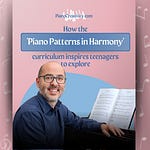
Share this post